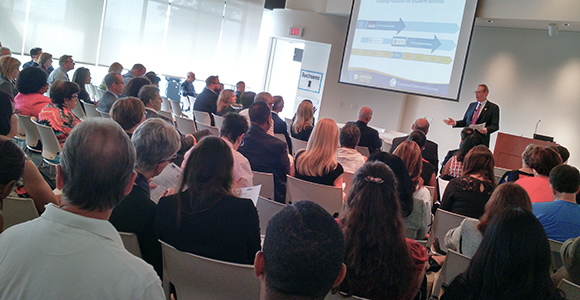
California Community Colleges Chancellor Dr. Brice Harris presents the recommendations created by a task force to close California’s skills gap. (Photo Credit: John Guenther)
“Our clients are looking for a skilled workforce. The skills gap must be closed.”
Those words by JP Morgan Chase’s Robert Lagace kicked off the unveiling of 25 recommendations by the California Community College Board of Governors Task Force on Workforce, Job Creation and a Strong Economy at a meeting at Los Angeles Trade Technical College near downtown. A similar briefing will be held in San Francisco on Thursday.
JP Morgan Chase sponsored the Strong Workforce Town Hall Series that was held throughout California earlier this year.
How big of a challenge is a trained workforce to California’s employers?
Pete Dietrich, senior vice president for transmission and distribution from Southern California Edison told attendees Edison needs to hire 200 qualified electrical workers every year but can’t find them all in California.
“Right now the union hall benches are empty of qualified linemen and we have had to go outside of California to try to identify and recruit qualified workers,” he told the audience, adding that the Community Colleges have a key role to play to address this workforce shortage.
Chancellor Brice Harris explained each of the 25 recommendations to the audience (You can read them here).
The recommendations include seven main areas of emphasis:
- how to improve student success
- better define and promote career pathways that students can follow
- measuring data and outcomes
- streamline curriculum changes while being more responsive to labor market demands
- identifying and recruiting more Career Technical Education (CTE) full-time faculty
- improving regional coordination
- funding for career technical education
“We need a stronger, more robust workforce for our region,” said Kish Rajan, president of the Southern California Leadership Council told the audience. “The Community Colleges play a key role in that work.”
Lest you think this is just a California problem, it isn’t.
Robin Boggs, U.S. corporate citizenship lead for Accenture, told the audience “employers nationally face challenges finding qualified people.”
She cited a poll of employers that found 46 percent say they can’t find qualified workers and 51 percent of companies will pay for more training to address the problem.
The task force recommendations will be turned into policy and presented to the Board of Governors in November. Chancellor Harris told business leaders that he would continue to need their help.
“Business and industry must stay connected with us so that we can align our training programs with industry needs,” Harris said.
He also indicated that the community colleges are identifying things they can do better.
“I’ll admit to you that our curriculum approval process is too slow,” he said. “We are working on that right now.”
California’s community colleges have a strong career technical education mission which, with added emphasis and prioritization, are well position to close the skills gap. The Task Force is composed of 26 people, half from inside the system and half from around the state. It identified very quickly that for many of the workforce challenges facing California there is not a “one size fits all” solution.
For instance, given the regional nature of California’s economy, what works in an urban area may not work well in a less populated part of the state.
“The skills gap needs varying widely in the regions,” said Van Ton-Quinlivan, the vice chancellor for workforce and economic development for the Community Colleges and a nationally recognized thought leader on workforce issues.
She also reminded the town hall why creating better CTE programs is so important.
“Career Technical Education grads earn on average $66,000 annually five years after they have been trained,” she said. “That makes CTE a very powerful policy tool as a way to lift Californians out of poverty.”
The California Economic Summit, which will be held in Ontario, California on November 12 and 13 has again designated workforce as a key issue in its efforts to improve middle class job creation in California. The latest challenge that grows by the day is that one million middle skills jobs in California must be filled.
The Community Colleges play a key role in meeting that demand.
“If we don’t get it right in California, not only California but the country stands to lose its global competitiveness,” said Chancellor Harris.

